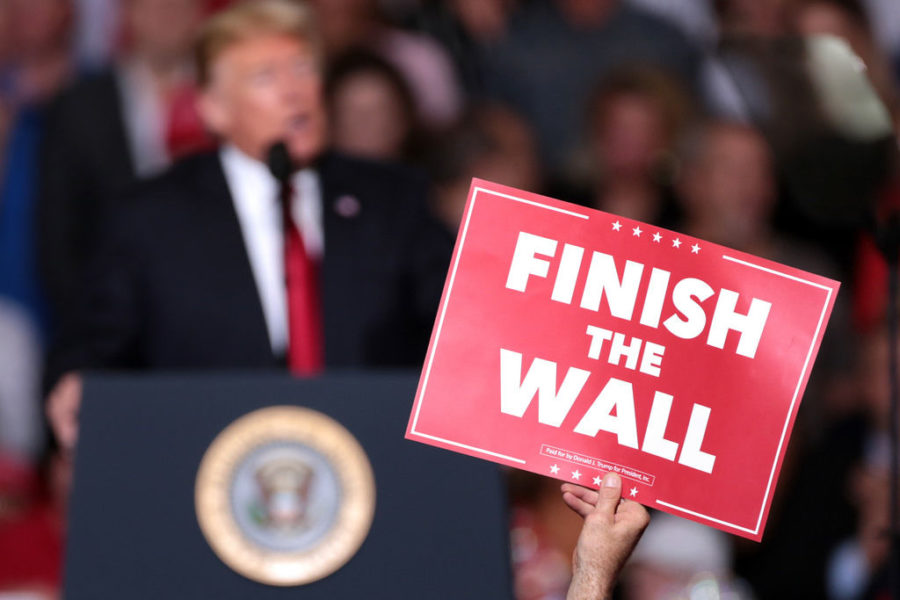Tyrrell: Let’s talk about political correctness
Finish the Wall sign at a Make America Great Again campaign rally for President of the United States Donald Trump at International Air Response Hangar at Phoenix-Mesa Gateway Airport in Mesa, Arizona.
July 24, 2019
Political correctness. Reviled by the conservative right, flung as an insult by the current president; these days to be “politically correct” is to be weak, to succumb to the demands of a too easily offended society. When headlines like this one go viral on Twitter, it’s hard not to agree; does anyone really care whether a manhole is gender-specific or not?
But often the term is used in a more sinister lamentation. When President Donald Trump demanded a “complete shutdown of Muslims entering the United States,” he tossed that statement under the umbrella of political correctness, saying that what he had said was “very important and probably not politically correct.” But I think most Americans would agree that blocking all Muslim immigration into the country is just flat out prejudice. Describing such statements as “being politically incorrect” acts like a shield for that prejudice; it makes it easier to swallow, makes it seem, somehow, like a good thing.
A key tenet of Trump’s platform has always been that he “tells it like it is.” That quality — supposedly of honesty (Trump has lied to the public, on average, 12 times a day) — draws voters to him. He doesn’t stick to the script or hide the way he feels; if he thinks no Muslims should be allowed to enter the country, if he thinks the media is the “enemy of the people” and feels like insulting his opponents’ physical appearances, then he says it. He’s attractive to people because he breaks these “rules” of what you can and cannot say as a politician.
Here is the sticking point of this whole conundrum, though: Most of the time, those “rules” are just morals. And being a decent human being. If you like Trump because he puts into words what you were already thinking, then what you were thinking was probably racist. Or discriminatory. Or immature, sexist, unprofessional or a thousand other terms that fall under his self-described “political incorrectness.”
When Disney released “The Force Awakens” and it became clear that the protagonist was going to be a woman, there was pushback. The same thing happened with the release of “Captain Marvel” and with the even more recent announcement of a female Thor. Some fans think that such changes in the demographics of these previously male-dominated stories is unnecessary and included simply to be “politically correct.”
In my opinion, that’s where the real heart of the problem is. There are women in the world. Excluding them from these stories is just being blind from the reality of the world. Labeling racist statements as “politically incorrect” is just closing your eyes to racism. In general, being “politically correct” just means being a decent person. It means looking beyond your own experience in the world and seeing that there are other ways to be, and that those ways to be are valid.
Changing the labeling on manhole covers to be gender-inclusive is kind of ridiculous. It’s true that sometimes, people get offended over something small. But let’s broaden our horizons as a society and ask ourselves if that “small thing” is truly insignificant, or if it just seems small to us because we aren’t willing to open our eyes and see a much bigger world outside of our own experience.
















